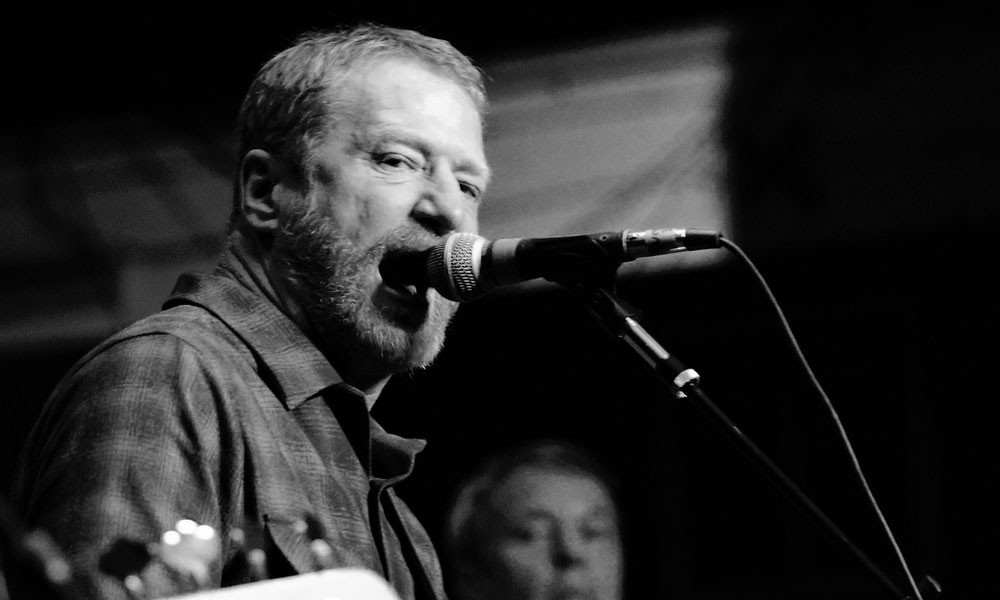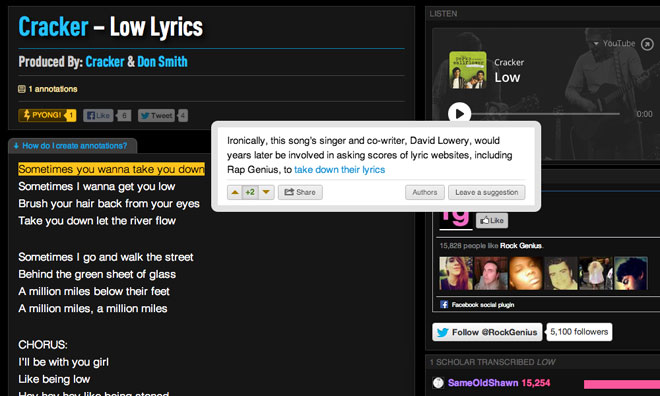
How a Rock Star Helped the Music Industry Take on Rap Genius
Based on recent research, a music publishers group fired a salvo this week against dozens of high-traffic websites it says may be illegally posting music lyrics. The most interesting part of the saga? The research was done by a platinum-selling alternative rocker.
Based on recent research, a music publishers group fired a salvo this week against dozens of high-traffic websites it says may be illegally posting music lyrics. The most interesting part of the saga? The research was done by a platinum-selling alternative rocker.
Editor’s note: Please see the bottom of the story for an update.
If you’re a fan of both ’90s alternative rock and the popular lyrics annotation site Rap Genius, prepare to feel conflicted.
Earlier this week, the National Music Publishers Association (NMPA) sent a series of takedown notices to a number of popular music lyric sites—most notably Rap Genius, the highly funded startup whose tech-heavy approach to the medium has drawn a large fan base—based on a report by a University of Georgia music business lecturer well versed in the subject.
Based on the popularity of lyric searches, it is possible that, unlike the sound recording business, the lyric business may be more valuable in the internet age.
The lecturer’s name? David Lowery—a rock star known to millions of Gen-Xers as the lead singer of two popular bands, Cracker and Camper Van Beethoven. Here’s one of Cracker’s best-known songs, “Teen Angst (What the World Needs Now)”:
More details on the situation below:
About the takedowns: NMPA’s takedown notices went to 50 different lyrics websites, which often bank on high-ranking search-engine results to build traffic for their content. In a statement, NMPA CEO David Israelite emphasized that the association was not going after regular blogs but sites it believed were profiting illegally. “These lyric sites have ignored the law and profited off the songwriters’ creative works, and NMPA will not allow this to continue,” Israelite said. The report Lowery wrote [PDF] is based on a formula called the “undesirability index.” It parses out lyrics sites that have high search rankings but don’t appear to be licensed by industry groups. (Rap Genius topped the list.) Lowery’s report notes that a number of sites license the content legally, and one of them, AZLyrics, does particularly well in searches—evidence that lyrics could become an important revenue stream for publishing firms. “Based on the popularity of lyric searches, it is possible that, unlike the sound recording business, the lyric business may be more valuable in the internet age,” Lowery wrote.
Why Lowery got vocal: Still an active figure in the music industry, Lowery has recently gained attention—and was the subject of a New York Times profile—for his skepticism of industry practices in the digital age, which he says are leaving cult artists like himself behind. Last year, for example, he wrote a widely shared piece offering the artist’s perspective on file-sharing in response to an NPR intern’s blog post stating that she didn’t pay for much of the music she has. Lyrics sites, Lowery notes, could have much more value to musicians in the age of Spotify than they did earlier. “Unlicensed lyric sites are largely ignored as copyright infringers, but in fact these sites generate huge web traffic and involve more money than one might think,” Lowery said in an NMPA statement.

Rap Genius responds: Rap Genius (which raised $15 million from a venture capital firm last year but does not currently run ads) disputes the association’s claim that it adds little value to the lyrics it posts. “The lyrics sites the NMPA refers to simply display song lyrics, while Rap Genius has crowdsourced annotations that give context to all the lyrics line by line, and tens of thousands of verified annotations directly from writers and performers,” cofounder Ilan Zechory told the Times. “These layers of context and meaning transform a static, flat lyric page into an interactive, vibrant art experience created by a community of volunteer scholars.” As shown above, the site got in a subtle dig on Lowery, via a moderator-written annotation on his most famous song, “Low,” which was a Billboard Hot 100 hit for Cracker in 1994.
Update: Since this was published on Wednesday, Rap Genius announced that the company did in fact have licensing rights to more than 2 million songs—something that wasn’t publicly announced until after the takedown notices were sent by the NMPA. Check out an update to the story over this way.
University of Georgia lecturer David Lowery, shown playing with his band Camper Van Beethoven. (photo by Birkinbine/Flickr)






Comments